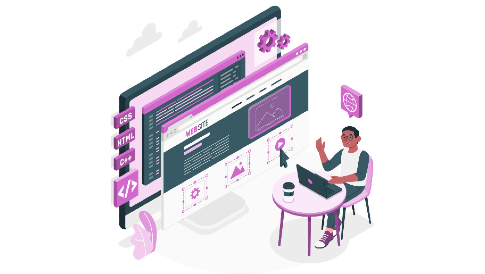Exploring the Web Design Career Path: How Experience Impacts Your Salary
When choosing your graphic and web design career path or even your next job, there are several factors to consider, including how much you will enjoy the job, current earnings and earning potential, and career progression opportunities. In a time of spiraling digital demand, web designers are highly sought after. According to tech recruiter Motion Recruitment’s IT Salary Guide, the tech industry remains a job candidate market, with overall salaries increasing by 6.7% in the first half of 2022. Unsurprisingly, plenty of freelancing gigs and permanent jobs are up for grabs for the right talent. But what is the right talent? And in a time of burgeoning need, how does experience impact your salary?
How Much Do Web Designers Get Paid?
A web designer’s salary will vary for various reasons, including specifics of the job description, levels of responsibility, experience, location, and the size and success of the hiring company. According to Glassdoor, a web designer can earn from $49k-$85k.
Experience and Earning Potential
Levels of experience, skill, and responsibility are some of the most significant factors impacting salary in any industry, but especially the tech industry. While there is increasing demand for skilled web designers, there is a responding rise in aspiring web design specialists. More people are entering the industry at lower levels, leaving a higher void in the ranks, which means that there is potential for people with less experience to rise through the ranks faster. In general terms, web design jobs can be split into three categories:
- Entry-level web designers may be straight from college or have had successful internships. They are unlikely to have any significant previous experience other than work experience or internships. With a salary of just over $40k per year, entry-level positions are a great way to gain access to a company you want to work for and gain industry experience to seek promotion as soon as possible.
- Junior web designers will usually have some experience under their belt. There isn’t much distinction between an entry-level and a junior post. As such, it is possible to progress to this level pretty quickly and be rewarded with a reasonable increase in salary. However, it is harder to progress from here to the next level, and your progression rate will depend on your performance, aptitude, attitude, and industry needs.
- Senior designers – you will lead a web design team as a senior designer. In a medium to large organization, it is most likely to take years to rise to the level of senior web designer, but in micro companies, the promotion may come more quickly. This is particularly common if an organization wants to play it safe and recruit internally, which is often the case with senior designers who know the team and processes and can fit seamlessly into the role.
Web Designer Specialties
The salary of a web designer will depend on experience to some extent, but it may also depend on the specialty. Like entry-level roles, some niches are more accessible to master, and their salary reflects that.
- UX designers – on average, UX designers earn a little more than other designers. Focusing on the customers’ user experience, the UX designer needs an eye for detail and a wealth of skills, including coding, responsive design, analytics, and prototyping. It takes a relatively long time to develop these skills and as such, more experience is required to achieve a UX role, but the salary is higher, too.
- UX researchers – a stop on the way to the role of UX designer, the researcher needs skills in researching, coding and analytics. They will look at what clients do, how competitors succeed, and be involved in prototyping actions designed to meet requirements based on those analytics.
- Web designer – the first rung on the ladder, as a web designer you will gain a deeper understanding of the range of roles, responsibilities, and career opportunities available to you in the coming months and years. This is a great place to start and offers a reasonable average entry-level salary.
Career Development for Web Designers
In a growing market, there is an opportunity for ambitious young professionals to break the mold regarding career progression and propel themselves within their niche. One way to support your career development is to invest time in gaining relevant certifications and accreditations. There are a range of web design certifications that require you to undertake different skills tests, often ending with a project-based end point assessment or exam. Thanks to the diversity of expertise required in web design, training, and development opportunities cover niche skills so that you can look at the roles you want, identify areas of strength as well as points for improvement in your own skill set, and create a strategy to fill any gaps to make you an attractive candidate for the job you want.
By gaining web design qualifications, you are not only demonstrating your skill, but you are also showing to your employer that you are committed and professional and that you aspire to more than your current role. What’s more, during the training process, you may meet fellow students, trainers or mentors who can help you to progress your career further.
When choosing the most suitable training program, consider what you enjoy and are good at. See which roles in your organization require skills that align with your ones and match your salary and responsibility aspirations. By identifying areas of development, an ambitious web developer can set their web design career trajectory to exceed industry norms.
Web Design Career Path – Final Point
There is a wealth of opportunity for those who are already in a web design role or those who are considering web design as a career. While your earning potential will largely be governed by your talent, attitude, and ability, experience will likely impact your salary. You can gain additional experience by saying “yes” to every opportunity that comes your way. However, suppose you want to increase your earning potential outside of gaining more experience. In that case, it is wise to look at the different niches available within the role and focus on developing skills that will allow you to earn the top wages.
If you are uncertain about what web design career path you would like to follow, do the research! Check out tech job pages, follow organizations that you may like to work for, and get a good idea of what employers are looking for so that you can develop your skills to get the salary you want.




Leave a Reply